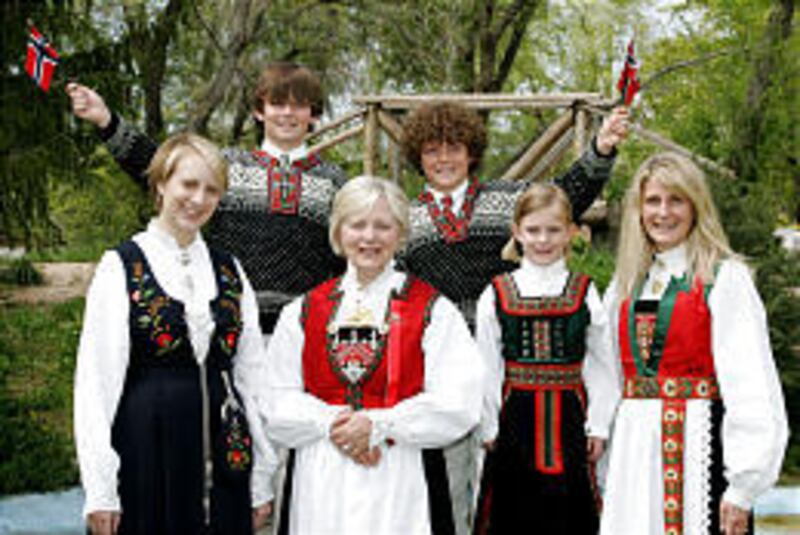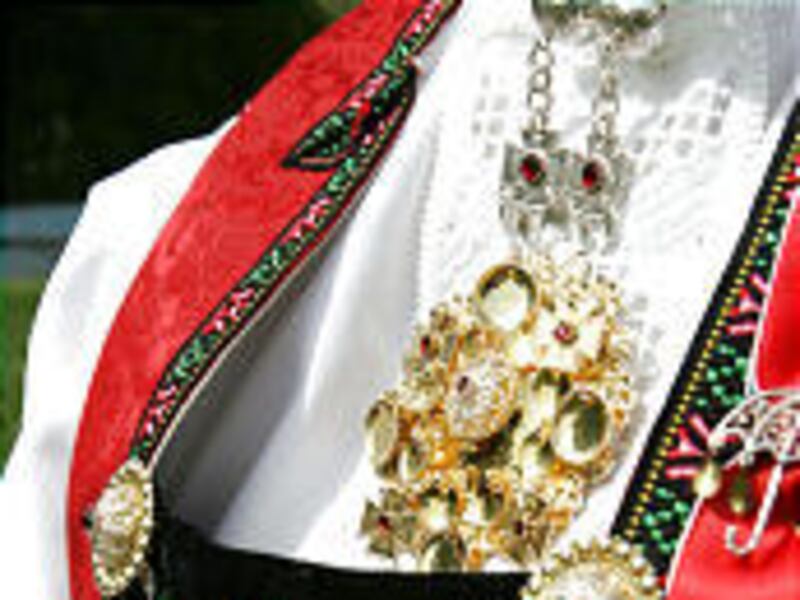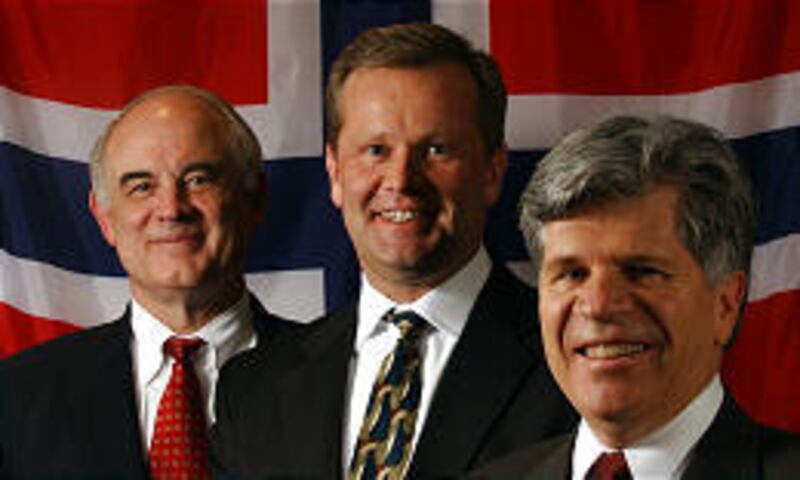Norway traces its national identity back to the time of the Vikings, so it might be surprising to learn that as a modern, independent nation, it is celebrating its centennial this year.
Tales of longships, sagas of exploration and conquest reach back to the first millennium. This Viking Age, which historians place from the 8th century to the 11th century, marked the time when Norway was first united as a single kingdom as well as when it often carried Norwegian ideas and beliefs abroad.
At its height, the Kingdom of Norway included not only the spoon-shaped country on the northeast tip of Europe but also the Faeroe Islands, the Orkney Islands, the Hebrides, Isle of Man, Iceland and Greenland. The culture and nationalistic attitudes developed in these early years would sustain Norway's identity through a 400-year union with Denmark, which began in 1380, when, due to lack of another heir, the king of Denmark also became the king of Norway.
The country's fate took another turn in the Napoleonic Wars, when the king of Denmark-Norway allied himself with Napoleon — and lost. Control of Norway was given to Sweden, which fought on the other side, when the French emperor was defeated in 1814.
Although Norway wrote its own constitution, which was adopted on May 17, 1814, it remained a part of the Swedish union for another 91 years. On June 7, 1905, in a peaceful move, Norway was granted its independence and became once again a free country all its own.
Those two dates are important to every Norwegian, said Berit Price, who was born in Norway and now lives in Salt Lake City. But May 17 has become a national holiday known as Constitution Day and is celebrated in Norway as well as by Norwegians and those with Norwegian roots in other places throughout the world. This year's festivities take on special significance, however, "because we are also celebrating 100 years of independence," said Price.
Utahns with Norwegian connections and roots will be marking the occasion on Saturday with a gathering at the Norway section of the International Peace Gardens, where there will be food, music, children's games and other activities. In addition, said Price, you'll see national costumes everywhere. The traditional bunad, which is all handmade, is still worn for weddings, holidays and other ceremonial occasions.
Norwegian General Consul Are-Jostein Norheim will be the special guest at the Saturday celebration, and the new Norwegian Consul in Utah, Lars-Erik Johansen, will be introduced.
Johansen, who works as vice president for finance and planning at Dyno Nobel, a Norwegian company with offices in Utah, came here in 1989 on a two-year assignment. "I liked it so much I stayed."
He was initially somewhat surprised to learn of the many Norwegian connections in Utah. "A high number of early Scandinavian settlers came here because of the (LDS) church. Now we have a lot of students who come to Brigham Young University and the University of Utah. There is also some commerce. So there is a long and close connection between the two countries."
Dyno Nobel, started by Alfred Nobel, who invented dynamite, manufactures and sells explosives. As consul, Johansen's duty is to "represent the interest of Norway and act as a bridge between the two countries." Many of the tasks involve passports and visas and travelers who have problems. But there are ceremonial duties as well, especially at Christmas and on Constitution Day. It will be an honor to participate in Utah's centennial celebration, he said.
Erlend D. Peterson, associate international vice president at BYU and one of three Utahns who have been knighted by the Norwegian king for "contributions and services to Norway" (the other two are businessman and banker John Langeland and skier Stein Eriksen), will actually be in Norway on Constitution Day. He will accompany the BYU Wind Symphony, which will be in Oslo, participating in celebrations there.
Peterson's Norwegian connections stretch back to his great-great-great-grandfather, Svend Larsen, who was the first resident of Norway to join the LDS Church after meeting with Erastus Snow in Denmark. "Svend transported the first Mormon missionary to Norway in October 1851. He and his family left Norway in 1853 for Utah," explained Peterson.
Since then Peterson not only served a mission there but both he and his father have served as LDS mission presidents in Norway, and he has observed an interesting phenomenon, he said. Practically every missionary comes home with at least one Norwegian sweater (famous for its intricate knitting) and when he gets married gives at least one of his children a Norwegian name.
There's something about the country, Peterson said, that grabs hold of you and doesn't let go. It may be that early history or the beautiful scenery or the feeling of nationalistic pride you encounter everywhere, but it has a lasing impact, he said.
As he was growing up, "we blessed the food using a Norwegian prayer at every meal. Father taught us Norwegian folk songs."
In his own home, it was a tradition to make Norwegian pancakes for breakfast every Saturday morning. Every time he goes to Norway, he takes along an empty suitcase to fill with jars of raspberry jam to bring back for the pancakes.
Peterson has also been instrumental in bringing a number of Norwegian dignitaries to Utah. In addition to musicians, business, education and cultural leaders and government dignitaries, the royal family has also come here. "We were very fortunate to have the royal family visit during the Olympics," said Peterson. "We are fortunate with the relationship we have."
A lot of Norwegians are unaware of the country's ties to Utah, he said. "They know that large groups emigrated to Minnesota and North Dakota, but they don't realize so many came here."
Composer Merrill Jenson is another Utahn with Norwegian roots. His mother, in fact, grew up in the same town skier Alf Engen grew up in. She left just before Adolf Hitler invaded Norway in World War II. "She was always proud of her culture and heritage. I really grew up in a Norwegian home — the language, the traditions, the music."
Jenson also served an LDS mission in Norway. And Norwegian pancakes are a tradition at his house, too. "We always have a pancake dinner between sessions on Conference Sundays."
But it is the music that may have had the biggest impact. "I discovered Edward Grieg very early, and my music is still influenced by that." His music company, in fact, is called Trollhaven Music. And he was very proud to have a symphony he wrote in the style of a Viking saga premiere at Carnegie Hall in New York.
During the 2002 Winter Games, Jenson served as a driver for Norwegian athletes. "I saw more Norwegian flags than any other country. " In Norway, every house has its own flag pole, and those nationalistic attitudes run deep. "I still can't sing the national anthem without tearing up," Jenson said.
So, maybe that explains a little why the centennial celebration is such a big deal wherever Norwegians are, he said. "For such a little country, it has a wide influence."
Peterson agrees. "I can honestly say that not a day goes by that I don't reflect on my love of Norway. This celebration is very significant for us all."
E-mail: carma@desnews.com





